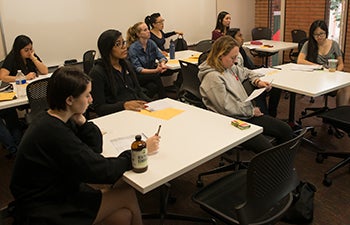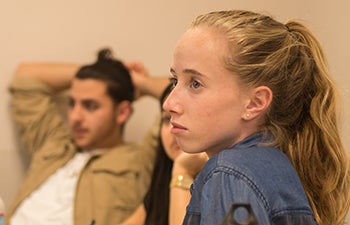
Ahead of the Game
Going into her junior year, Lillian Zazueta decided she wanted to pursue a career in law. Investigating related internship opportunities, the comparative literature major and Russian minor learned about the Joint Educational Project’s (JEP) Pre-Law Project.
Zazueta signed up for the program, landing an internship at Los Angeles’ Esperanza Immigrant Rights Project in Spring 2014. There she started out performing basic duties such as answering phones and making copies. But she soon took on more significant responsibilities, conducting legal screenings and leading Know-Your-Rights presentations and legal paperwork workshops.
When the semester ended, she was invited to stay on as a summer intern.
“Because of my Pre-Law Project internships, I now have job offers from two JEP partner organizations when I graduate,” said Zazueta. “Having the opportunity to not only intern, but to network with people working in the field of law is an invaluable experience that very few undergraduate programs offer.”
The JEP Pre-Law Project is an intensive service-learning internship program designed for pre-law students and those interested in legal careers. It affords undergraduates direct experience working with local nonprofit and public interest law firms as well as an opportunity for professional mentorship.
Throughout the course of students’ eight-week internships, site work is supplemented by personal reflection writing exercises, bi-weekly group discussions, guest lectures and the completion of an internship portfolio.

Students meet for a Pre-Law Project training session. At the beginning of the semester, participants receive guidance on creating strong résumés and cover letters.
In Fall 2014, Zazueta became the Pre-Law Project’s student director. She worked hard to develop the program even further to benefit participating interns and shape them into optimal law school, graduate school and job candidates.
“All of the program requirements exist because they have real-world applications and prepare students for law and grad school applications, and future jobs and internships,” she said.
“Even though the Pre-Law Project isn’t tied to courses like most of our programs, because JEP is at its heart a service learning organization, we wanted to keep the reflection component with discussions and papers,” said Jacqueline Whitley, director of nonprofit partnerships at JEP and the program’s staff liaison. “We think it’s an important part of learning.”
At the beginning of each semester, the group discussions are focused on perfecting résumés and cover letters as students begin applying for internships. They can apply to work at one of five current partner organizations: Alliance for Children’s Rights, Bet Tzedek, the Wage Justice Center, Esperanza Immigrant Rights Project and the Los Angeles County Bar Association’s L.A. HIV Law and Policy Project.
These organizations offer exposure to immigration law, low-income workers’ rights, pro bono legal services for low-income individuals, children’s rights for impoverished and abused youth, and legal services and policy research support for people living with HIV and AIDS in Los Angeles.
“The Pre-Law Project is a great way for undergrads to get very competitive internships without having to compete with law students for a limited number of spots,” said Zazueta.
Largely student run, the Pre-Law Project was started in Spring 2013 by former JEP volunteer Kelley Lowe, who graduated from USC Dornsife in 2010, then a second-year law student at the USC Gould School of Law. She saw the need for a program that would allow students to explore the field of law before making the substantial investment to attend law school and gain the real-life understanding that is only developed through practical experience.

The program “is a great way for undergrads to get competitive internships without having to compete with law students,” said a participant.
This Spring’s student director is junior Jiaqi Wang, a business major at the USC Marshall School of Business.
“I oversee all the interns, do trainings, lead group discussions and give feedback on their essays,” Wang said. “At the end of the semester, students put together a portfolio — if they want to apply to law school, this could mean a complete personal statement, and if not they can also write a legal brief or opinion piece.”
Junior comparative literature major Ruby Hwang was drawn to the program because she saw it as a great introduction to the legal profession. For students without experience in law it can be difficult to find resources, she said. Working in public interest law solidified her desire to go to law school when she realized how much of an impact an attorney in the field can make.
Last Fall, she worked at Wage Justice Center, a firm that collects back wages and penalties owed to low-income workers.
“The internship was in a small office so I got a lot of attention,” she said. “I did a lot of hands-on work and I even met some of the clients directly. I also did background work like filing and organizing paperwork, which felt worthwhile because I realized that every single document had to do with a person’s life.”
By the end of the semester, as part of her portfolio, she had crafted her personal statement for her law school application.
“I had no idea that I’d learn so much in such a short amount of time,” she said. Hwang plans to apply for law school next year to pursue human rights law, perhaps women’s rights or international law.
Beyond the potential for personal enrichment, the competitive edge the program offers is undeniable.
“Students get experience dealing with the law directly,” said Whitley. “The fact that they can speak to what they saw happening in their work, discover what they really love and what they don’t — that puts them a step above the rest in the application pool and even once they start law school.”
“The Pre-Law Project really helps students see what’s out there and make a more informed decision about their future,” added Wang.